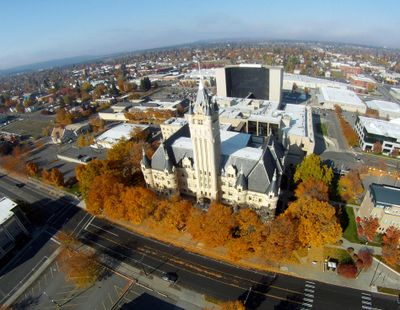MacArthur Foundation grants another $1.9 million for criminal justice reform in Spokane County

Spokane County will receive a new round of grant funding from the MacArthur Foundation – a total of $1.9 million over the next two years – to continue efforts aimed at reducing the county jail population and eliminating racial disparities in the local justice system, officials said Tuesday.
The funding comes in addition to another $1.9 million the foundation awarded to the county in 2015 and 2016 as part of its Safety and Justice Challenge.
Although the Spokane County Jail remains overcrowded, local officials, community activists and MacArthur Foundation representatives said they are encouraged by the collaborative spirit that has guided reform efforts so far.
“Spokane County was selected for additional funding based on the promise of their work to date, plans to take reform efforts further, and the commitment of local leaders to implement changes that will make the local justice system fairer and more effective,” MacArthur spokesman Sean Harder wrote in an email.
A portion of the new funding is a $150,000 supplemental grant that will be used to create a “peer navigator” program to connect people with resources and mentoring after brushes with the law. The program will be led by formerly incarcerated people who can share firsthand experiences of life after crime.
Carmen Pacheco-Jones, who leads the racial equity committee of the Spokane Regional Law and Justice Council, said the pilot version of the peer navigator program will be open to about 20 people who will be selected through a referral system. The program will last four to six months, and like other programs, address problems such as drug addiction.
“We’re also putting an emphasis on employability,” Pacheco-Jones said. Research shows that crime results from economic insecurity, and so a person with a stable job is less likely to reoffend.
Other funds from the supplemental grant will be used to host monthly community meetings to share information and gather feedback on the reforms being implemented.
Maggie Yates, the county’s criminal justice administrator, said there will also be a renewed focus on data collection. The county plans to hire a full-time data analyst who will be tasked with linking software and databases in use by local courts and law enforcement agencies – a technical hurdle that has hindered past efforts to study demographic trends in the local justice system.
“The police force uses one system. The sheriff uses a system. Our jail uses a different system,” Yates said. “None of them are programmed in a way to talk to each other, so it makes pulling data and then cross-comparing them very difficult.”
Yates said the county prosecutor’s office also will launch a pilot version of a program that would allow some “low-risk, low-opportunity” offenders to avoid having certain charges filed on the condition they stay out of further trouble.
Additionally, the county will continue implementing the Public Safety Assessment, which produces scores indicating the likelihood a defendant would miss a court date or commit a new crime if released before trial. The PSA replaces a more complex risk-assessment algorithm known as SAFER, which was hampered by technical and logistical problems.
Harder, the MacArthur spokesman, acknowledged the county has faced setbacks, but he said there has been progress, too, including a beefed-up pretrial services department and programs designed to steer people out of jail and into treatment.
“Of course, safely reducing the jail population requires many different strategies, and there is no single solution or quick fix,” he wrote. “Creating meaningful change within the justice system takes time, collaboration and investment of resources, and we recognize that Spokane County still has more work to do.”